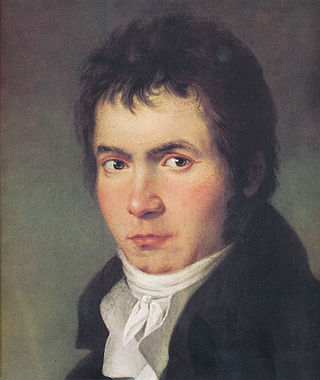Related Research Articles
Robert Wilfred Levick Simpson was an English composer, as well as a long-serving BBC producer and broadcaster.

Carl Czerny was an Austrian composer, teacher, and pianist of Czech origin whose music spanned the late Classical and early Romantic eras. His vast musical production amounted to over a thousand works and his books of studies for the piano are still widely used in piano teaching. He was one of Ludwig van Beethoven's best-known pupils.
This article is about music-related events in 1823.

"Gott erhalte Franz den Kaiser" was a personal anthem to Francis II, Emperor of the Holy Roman Empire and later of the Austrian Empire, with lyrics by Lorenz Leopold Haschka (1749–1827) and music by Joseph Haydn. It is sometimes called the "Kaiserhymne". Haydn's tune has since been widely employed in other contexts: in works of classical music, in Christian hymns, in alma maters, and as the tune of the "Deutschlandlied", the national anthem of Germany.

The String Quartet No. 1 in F major, Op. 18, No. 1, was written by Ludwig van Beethoven between 1798 and 1800, published in 1801, dedicated to the Bohemian aristocrat Joseph Franz von Lobkowitz. It is actually the second string quartet that Beethoven composed.
In music, variation is a formal technique where material is repeated in an altered form. The changes may involve melody, rhythm, harmony, counterpoint, timbre, orchestration or any combination of these.
Cyclic form is a technique of musical construction, involving multiple sections or movements, in which a theme, melody, or thematic material occurs in more than one movement as a unifying device. Sometimes a theme may occur at the beginning and end ; other times a theme occurs in a different guise in every part.

AntonJoseph Reicha (Rejcha) was a Czech-born, Bavarian-educated, later naturalized French composer and music theorist. A contemporary and lifelong friend of Beethoven, he is now best remembered for his substantial early contributions to the wind quintet literature and his role as teacher of pupils including Franz Liszt, Hector Berlioz and César Franck. He was also an accomplished theorist, and wrote several treatises on various aspects of composition. Some of his theoretical work dealt with experimental methods of composition, which he applied in a variety of works such as fugues and études for piano and string quartet.

Ferdinand Ries was a German composer. Ries was a friend, pupil and secretary of Ludwig van Beethoven. He composed eight symphonies, a violin concerto, nine piano concertos, three operas, and numerous other works, including 26 string quartets. In 1838 he published a collection of reminiscences of his teacher Beethoven, co-written with Franz Wegeler. The symphonies, some chamber works—most of them with piano—his violin concerto and his piano concertos have been recorded, exhibiting a style which, given his connection to Beethoven, lies between the Classical and early Romantic styles.

The Fantasy for piano, vocal soloists, mixed chorus, and orchestra, Op. 80, usually called the Choral Fantasy, was composed in 1808 by then 38-year-old Ludwig van Beethoven.
The six String Quartets, Op. 76, by Joseph Haydn were composed in 1797 or 1798 and dedicated to the Hungarian count Joseph Georg von Erdődy (1754–1824). They form the last complete set of string quartets that Haydn composed. At the time of the commission, Haydn was employed at the court of Prince Nicolaus Esterházy II and was composing the oratorio The Creation as well as Princess Maria Hermenegild Esterházy's annual mass.

Vaterländischer Künstlerverein was a collaborative musical publication or anthology, incorporating 83 variations for piano on a theme by Anton Diabelli, written by 51 composers living in or associated with Austria. It was published in two parts in 1823 and 1824, by firms headed by Diabelli. It includes Ludwig van Beethoven's Diabelli Variations, Op. 120, as well as single variations from 50 other composers including Carl Czerny, Franz Schubert, Johann Nepomuk Hummel, Ignaz Moscheles, Friedrich Kalkbrenner, Franz Liszt, and a host of lesser-known names including Franz Xaver Wolfgang Mozart and others now largely forgotten.

Marie Leopoldine Blahetka was an Austrian pianist and composer.
The Kaiserquartett, English: Emperor Quartet), is a string quartet in C major by Joseph Haydn.
In music, Op. 73 stands for Opus number 73. Compositions that are assigned this number include:
References
- ↑ American Symphony Orchestra
- 1 2 Music Web International
- 1 2 3 4 Brana Records Archived March 4, 2016, at the Wayback Machine
- ↑ "Variationen auf 'Gott erhalte Franz den Kaiser' / Carl Czerny. Streichquintett G-Dur / Peter Hänsel [sound recording]". National Library of Australia . Retrieved 19 January 2020.
- ↑ "Variationen auf 'Gott erhalte Franz den Kaiser' (Musical CD, 1986)". WorldCat . Retrieved 19 January 2020.
- ↑ "Variations on "Gott erhalte Franz den Kaiser", Op. 73". YouTube . Retrieved 19 January 2020.